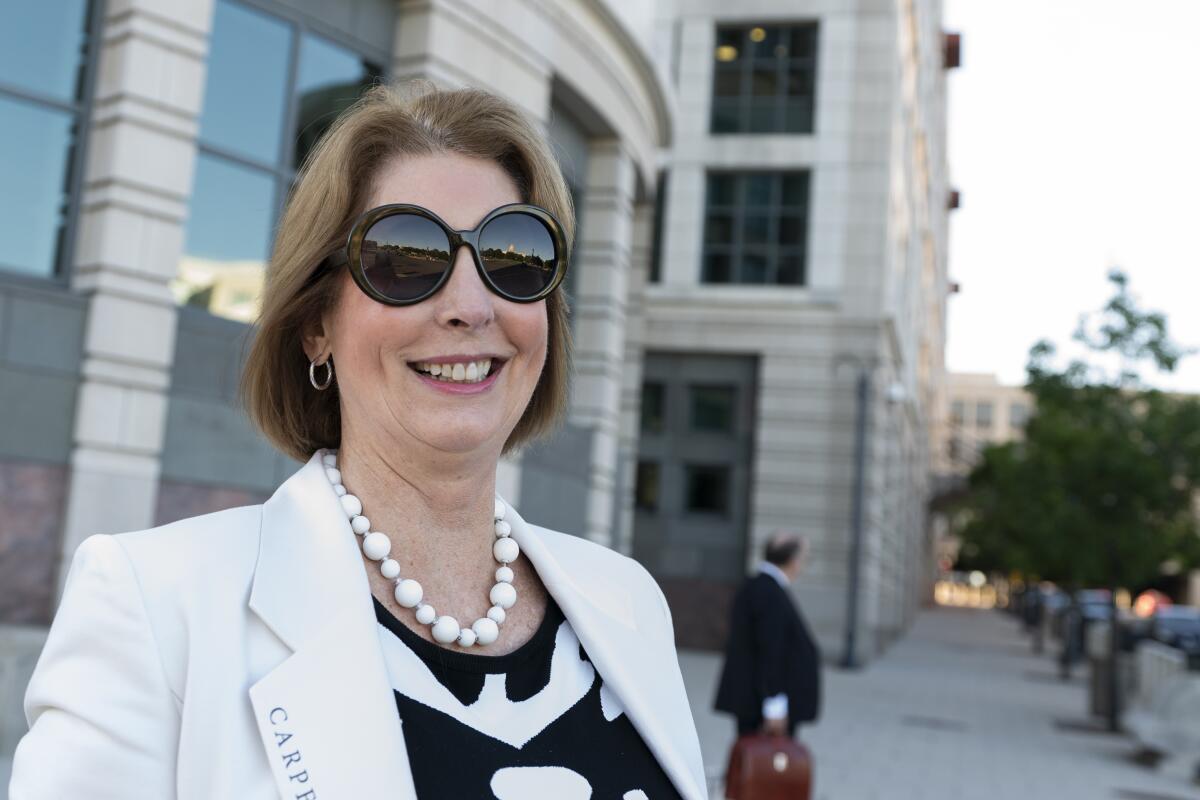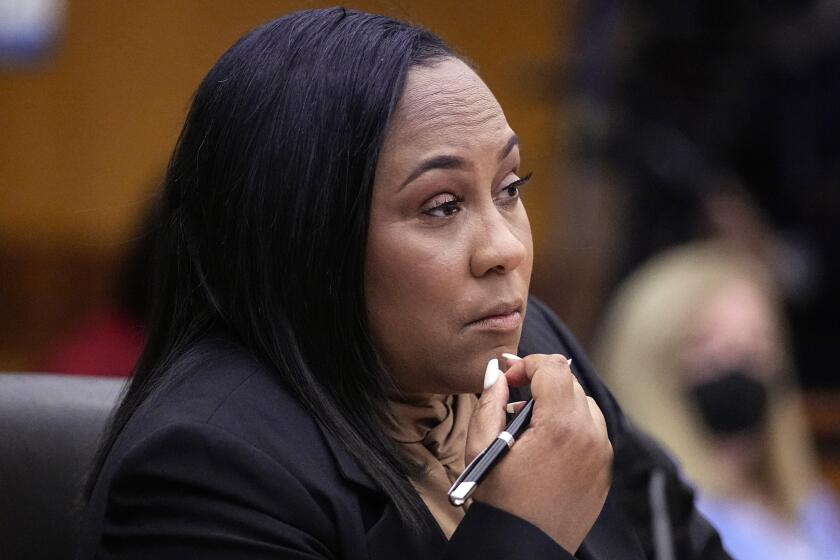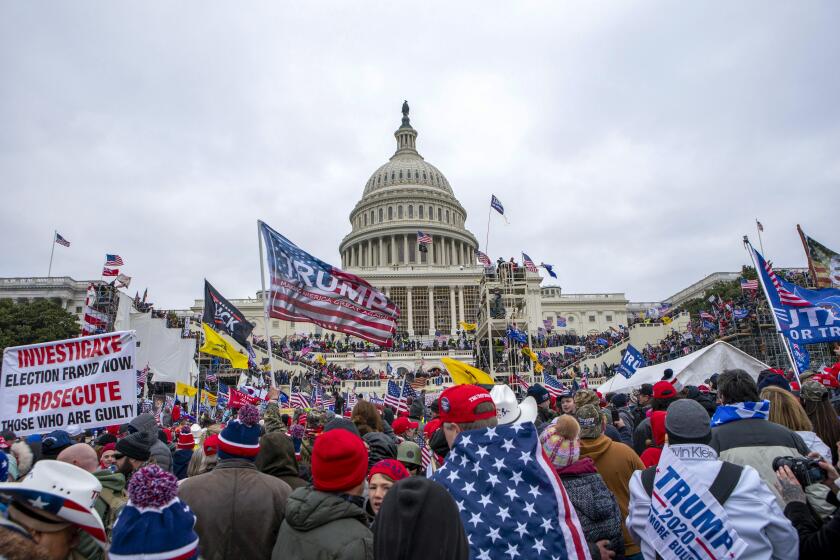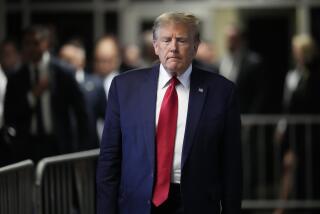Some of Trump’s co-defendants could go to trial this fall. Will he have to join them?

- Share via
The Georgia racketeering trial of Donald Trump and 18 other defendants is going to be as legally complex as it is politically charged. For an illustration of that, consider Wednesday’s hearing on whether two of the defendants should be allowed to sever their cases from the rest.
Attorneys Kenneth Chesebro and Sidney Powell were the defendants before Fulton County Superior Court Judge Scott McAfee, each arguing that they should be able to proceed separately from Trump and the other defendants. The thrust of their arguments was that the sprawling case includes voluminous evidence that has virtually nothing to do with them but would unfairly taint the jury’s impressions.
As McAfee quickly perceived, however, Chesebro and Powell weren’t so much making a compelling argument for separate trials as they were challenging the state’s racketeering law.
Litman: Trump’s Chief of Staff Mark Meadows seems to think he can avoid prosecution. Here’s how
His bid to remove the Georgia case to federal court appears to be part of a strategy to secure immunity and make Fulton County Dist. Atty. Fani Willis’ case go away.
It’s true that large portions of the case don’t really concern Chesebro or Powell. But that’s a consequence of their having been charged together under a law that in effect imposes legal consequences on each for the acts of the others. The potential for being judged for one’s co-defendants’ bad conduct, in other words, is inherent in the charge.
Chesebro’s move for a fall trial under Georgia’s strict speedy-trial requirements was a clever means of advancing his case for separation given the logistical challenges of trying the whole group that quickly. He was clearly chagrined to be partly foiled when Powell made the same argument.
Chesebro would clearly prefer to be alone at the defense table than linked to Powell, an unabashed conspiracy theorist whom his lawyer described as engaging in “more provocative,” “racially tinged” conduct. Chesebro’s counsel argued that Powell’s presence would cause prejudice against his client, saying, “I don’t know there’s a legal theory out there that says it, but it’s just a reality.”
But that, McAfee made clear, is where things are heading. There is no getting around a speedy-trial demand, which under Georgia law requires the jury to be selected and the proceedings to begin by Nov. 3, failing which defendants are automatically acquitted.
Fulton County Dist. Atty. Fani Willis also charged 18 others, including Rudy Giuliani and John Eastman, taking advantage of the state’s broad RICO statute.
The secondary headline from the hearing was the prosecution’s estimate that its case will take four months to present. Add to that the defense case and jury selection, and we’re looking at half a year, which, given the election the following November, is, of course, also half of a very important political calendar.
The question is whether the trial will be occupying a few defendants for much of 2024 or all of them — including the former and would-be future president. McAfee applied the three-part test for severance under Georgia law, which says cases may be severed if 1) there is a danger that evidence admissible against one defendant might be inappropriately considered against another; 2) the number of defendants would create confusion as to the law and evidence to be applied to each; or 3) the defense cases are so antagonistic to each other as to make it impractical for the jurors to reach a verdict.
The parties agreed the last factor doesn’t apply, and McAfee found that the other two don’t either. All the evidence in the racketeering case is admissible against both defendants, and the same law applies, so there’s no risk of confusion. Again, however unfair that may seem to Chesebro and Powell, that goes with the territory of a racketeering charge.
Special counsel Jack Smith’s investigation yielded an indictment of the former president for his role in events surrounding the Jan. 6, 2021, Capitol riot.
That leaves the even larger question, however, of what happens to the other 17 defendants, among them Trump. Here McAfee, who showed poise and preparation in the case’s first televised hearing, faces a tricky problem that calls for judicial finesse. Because Georgia law doesn’t really require severance of any of the cases, the default position that the prosecution advocates is that once one or more defendants are set for trial, the others follow unless they present their own valid reasons for severance. And Trump’s argument that he won’t have enough time to prepare his defense doesn’t really cut it unless Georgia’s speedy-trial law is unconstitutional.
But the upshot — rushing all 19 defendants into an early trial over their objections — would be bedlam. That’s why McAfee explained that his discretion is not limited to the law’s three-part test.
The judge also made a subtle point about the interplay of the severance motions with other defendants’ motions for removal of the case to federal court. If the federal court denies removal and is subsequently reversed on appeal, that would almost certainly be after the trial in state court had begun. And then what?
McAfee gave Dist Atty. Fani Willis’ office a last opportunity to persuade him with another round of briefs that the defendants must all go to trial together. But he telegraphed pretty clearly that he is heading toward at least two trials: an early one for the defendants who have invoked their speedy-trial rights and another for the rest — or at least those who remain in state court after the federal removal motions have been decided.
That has important consequences for the exigent national issue of Trump’s 2024 candidacy. First, if Chesebro and whoever joins him end up being acquitted in an early trial, which is less unlikely than an acquittal of the former president, it will strengthen Trump’s claim that the charges amount to a political witch hunt. Second, if Trump’s trial is held up for at least the six months dedicated to the speedier trial, it will dramatically reduce the likelihood that his case proceeds before the election.
In this sense, Wednesday’s hearing was just foreshadowing what’s to come. In the tumultuous year ahead, many more such normally inconsequential legal questions will have potentially huge consequences for national politics and therefore the future of our democracy.
Harry Litman is the host of the “Talking Feds” podcast. @harrylitman
More to Read
A cure for the common opinion
Get thought-provoking perspectives with our weekly newsletter.
You may occasionally receive promotional content from the Los Angeles Times.













